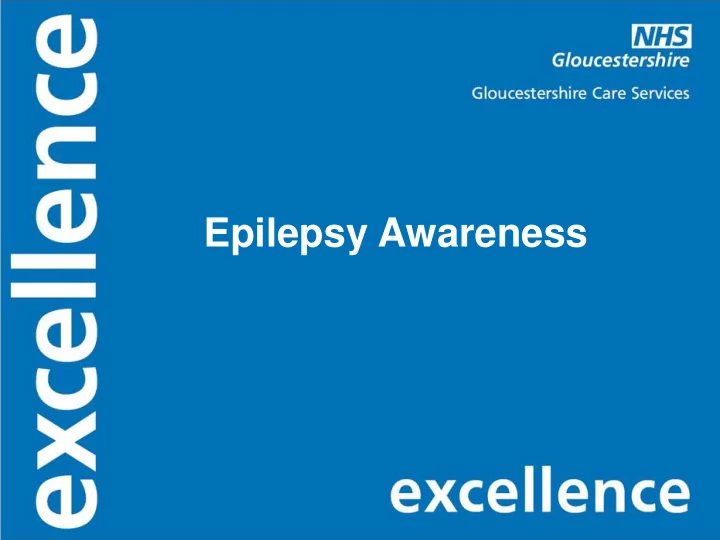

Epilepsy Awareness
What is Epilepsy? • Epilepsy is a condition that affects the brain. When someone has epilepsy, it means they have a tendency to have epileptic seizures. • Anyone can have a one- off seizure, but this doesn’t always mean they have epilepsy. Epilepsy is usually only diagnosed if someone has had more than one seizure, and doctors think it is likely they could have more. • Epilepsy can start at any age and there are many different types. Some types of epilepsy last for a limited time and the person eventually stops having seizures. But for many people epilepsy is a life-long condition.
What is a seizure? • Electrical activity is happening in our brain all the time, as the cells in the brain send messages to each other. A seizure happens when there is a sudden burst of intense electrical activity in the brain. This causes a temporary disruption to the way the brain normally works. The result is an epileptic seizure. • There are many different types of seizure. What happens to someone during a seizure depends on which part of their brain is affected. During some types of seizure the person may remain alert and aware of what’s going on around them, and with other types they may lose awareness. They may have unusual sensations, feelings or movements, or they may go stiff, fall to the floor and shake.
Types of seizures There are many types of seizure but the most common seizures you encounter are: • Partial • Tonic-clonic • Myoclonic • Atonic • Absent
Triggers • Triggers can vary greatly, and are specific to the individual. Commonly seen triggers can include : • Photosensitivity – 5% of people with Epilepsy • Stress (e.g. exams) • Lack of sleep • Diet (e.g. skipping meals) • Illness • Hormonal Changes and menstruation in girls • Problems or changes in medication and poor compliance with taking medications.
Medication and Treatment • Medication – Anti-epileptic medication (AEDs). Can be very effective. – Preventative not curative • Epilepsy Surgery – Possible alternative to long term medication – Indicated if the Epilepsy has a structural cause • Vagus Nerve Stimulation – Small electrical impulse generator implanted into skin. – Sends signals to the brain designed to stop or prevent seizures. • Ketogenic Diet – High fat low carbohydrate diet, mimics the effect of starvation on the body. – For difficult to control Epilepsy.
Emergency Procedure • If the child is not known to have Epilepsy dial 999 immediately. Do not move them but make the area as safe as possible by removing possible hazards. Protect the child/young person’s dignity as much as possible. • If the child is known to have Epilepsy, procedures in their agreed Healthcare Plan should be followed.
Emergency Medication • Some children may require emergency medication when they have a seizure. Details of this medication should be outlined in their Healthcare Plan and training can be given to education staff by the Children’s Epilepsy Specialist Nurse.
Individual Healthcare Plan • It is essential that all children/young people who have been diagnosed with Epilepsy have an Individual Healthcare Plan in school. • This plan should detail their specific condition, the triggers, what a seizure looks like for that particular child, how to respond if the child/young person has a seizure, any medication they are taking, emergency medication and how/when to give it and emergency contact information. • This plan should be available for all school staff who come into contact with the child/young person and should be easily accessible at all times.
Epilepsy Policies for Schools • Managing medicines in schools and early years settings • Medical conditions at school, a policy resource pack • Epilepsy policy for schools
Epilepsy Action Epilepsy Action aims to raise awareness and understanding of epilepsy, ensure people with epilepsy are supported in education, carry out research into epilepsy and education, provide training and information, and campaign and lobby for national change . www.epilepsy.org.uk Epilepsy Helpline Freephone: 0808 800 5050
Who to contact • For general information on Epilepsy and individual healthcare plans, contact your School Nurse. • For information regarding a specific child or for support with emergency medication training, please contact the Paediatric Epilepsy Specialist Nurse on 0300 422 5715
Recommend
More recommend